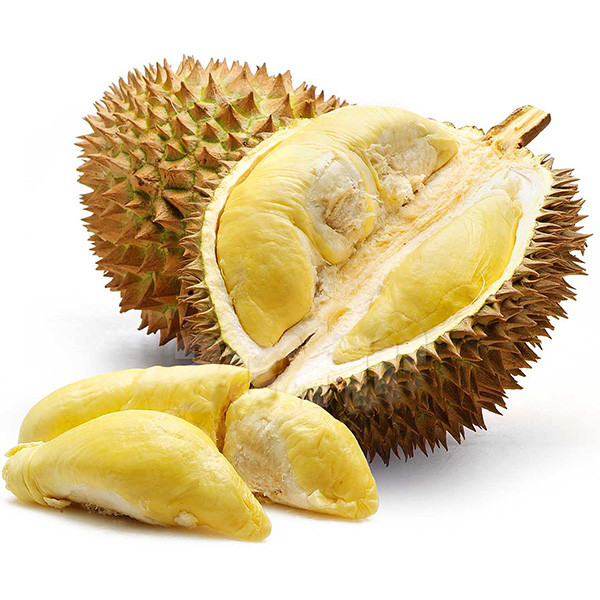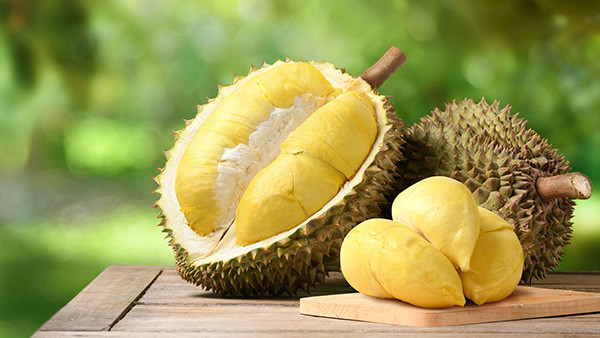Durian is a popular tropical fruit in Vietnam, known for its distinctive flavor and high nutritional value. However, many people are concerned about the calorie content in durian and its potential to cause weight gain if consumed in large quantities. This article from My Auris Dental will help you understand how many calories are in durian, whether it makes you gain weight, and the appropriate ways to eat it without affecting your health.
How many calories are in 100g of durian?
How many calories are in 100g of durian? This is a common question for those who love durian but are still concerned about their weight. According to nutritionists, the calorie content in 100g of durian ranges from 135 to 180 calories, depending on the type of durian, cultivation methods, and preparation.
For example, organic durian – grown according to clean standards – typically contains a higher nutritional content, which leads to a higher calorie count compared to conventional varieties. Additionally, roasted durian also provides more energy than fresh durian due to the cooking process.
A large durian pod can contain up to 360 calories, not to mention processed durian dishes with significant energy levels such as:
- Durian pia cake: approximately 400 calories
- Durian sweet soup: approximately 650 calories
- Durian sticky rice: approximately 750 calories
- Durian ice cream: approximately 456 calories
- Durian avocado smoothie: approximately 730 calories

Does eating durian make you fat?
The question “Does eating durian make you fat?” is a concern for many people on a diet. Durian is known as a high-fat fruit, with about 13g of fat per cup. Although some fat is essential for health, excessive consumption of surplus fat can negatively impact the body, especially by disrupting weight loss diets and potentially causing weight gain.
Not only rich in fat, durian also contains a large amount of carbohydrates. Specifically, each cup of chopped durian contains about 66g of carbs. Although carbohydrates provide energy for daily physical activities, consuming too many carbs makes it difficult for the body to lose fat and hinders weight loss when following a diet.
To enjoy the health benefits of durian without negatively affecting your physique, you should eat durian in moderation. It’s best to consult a nutritionist to determine the appropriate amount of durian for your diet.

What nutrients in durian are good for health?
Durian contains many natural nutrients beneficial for the body, such as carbohydrates, plant fats, vitamin C, B vitamins, potassium, and fiber. Despite being a fruit of the jackfruit family with a strong, distinctive odor, durian still deserves to be called the king of Southeast Asian fruits due to its comprehensive nutritional value.
As a tropical fruit with a high carbohydrate content (~27g)/100g, durian is an abundant source of energy for the body. Consequently, durian is often classified as an energy-rich food, suitable for those who need to gain weight or engage in a lot of physical activity.
In addition to natural sugars, durian also contains plant fats (~5g/100g). These are beneficial unsaturated fats for cardiovascular health if consumed properly. Durian also provides plant protein (~1.5g/100g), contributing to cell regeneration and maintaining bodily functions.
Another notable point is the relatively high fiber content in durian (~3.8g/100g). Fiber helps improve the digestive system, reduce constipation, and support blood sugar control after meals.
Durian stands out with its relatively high vitamin C content (~19.7mg/100g). This is a powerful antioxidant, supporting immune system enhancement, promoting healthy skin, and facilitating iron absorption. Additionally, durian contains B vitamins (B1, B2, B6) which play crucial roles in energy metabolism and nervous system regulation.
Potassium is a prominent mineral in durian, with approximately 436mg/100g. Potassium helps stabilize blood pressure, reduce the risk of stroke, and enhance cardiovascular health. This fruit also contains iron, magnesium, phosphorus, and zinc, which help balance electrolytes and maintain muscle and bone function.

How to eat durian properly to avoid worrying about getting fat
If not eaten correctly, consumers can easily consume excessive calories, leading to weight gain. However, if you know how to control your intake, you can fully enjoy this dessert without worrying about getting fat:
Choose the right time to eat durian
Avoid eating durian in the evening or close to bedtime. This is when the body’s energy expenditure is low, making it easy to store food energy as fat. Instead, eat it in the morning or at lunchtime, when your body is more active and has a better metabolic rate. People who exercise can eat a small amount after their workout to replenish expended energy.
Control the amount of durian per serving
A durian pod weighs approximately 150-200g, equivalent to 220–300 kcal. If you are managing your weight, you should only eat less than 100g per serving (equivalent to about half a pod). Do not eat more than twice a week if you don’t need additional energy intake.
Do not eat with other high-energy foods
Avoid eating durian simultaneously with sweet dishes like sweet soup, crepes, ice cream, or soft drinks. Combining multiple high-calorie foods will significantly increase your energy intake. It’s best to eat durian separately, without adding sugar, milk, or other fats.
Prioritize eating pure, unprocessed durian
When durian is processed into dishes like crepes, pastries, or ice cream, its calorie content increases significantly. For instance, a durian crepe can contain 300–400 kcal depending on the ingredients. Therefore, if you want to manage your weight, choose fresh durian and eat it directly, limiting variations.
Listen to your body and check your weight regularly
Durian provides natural nutrients like vitamin C, B vitamins, potassium, and plant protein, but it also contains many carbohydrates and fats. If you notice rapid weight gain after regular consumption, reduce the frequency and amount you eat. At the same time, combine it with regular exercise to prevent your body from accumulating excess energy.
Who should be cautious when eating durian
- People with diabetes: High glycemic index and abundant natural sugars make durian unsuitable
- Obese people or those at risk of weight gain
- People prone to internal heat, acne, or allergies to its distinctive strong smell

Frequently asked questions when eating durian
How many calories in a durian crepe
Durian crepe is a dessert combining ripe durian, fresh cream, and a thin crepe shell. A typical durian crepe weighs about 150g. The calorie content in a durian crepe ranges from 300 to 450 kcal per piece, depending on specific ingredients such as: type of cream, sweetness, and the amount of durian pulp used.
How to estimate calories in 1 durian crepe:
- Durian pulp (~80g): approximately 117–120 kcal
- Fresh cream (~30g): approximately 100 kcal
- Crepe shell (~40g): approximately 80–100 kcal
Total: approximately 300 – 320 kcal for a small crepe and can be up to 450 kcal for a large, creamier one.
How many calories in 2 durian pods
A durian pod weighs approximately 150g to 200g, depending on the variety. So, 2 durian pods can provide about 300–400g, equivalent to:
- Average calories: from 440 to 590 kcal
- If choosing a low-fat, low-sugar variety, the energy level might be lower but still high compared to many other fruits like bananas, soursop, or jackfruit.
Quick comparison table: Durian – Banana – Jackfruit
| Food Type | Amount | Calories |
| 2 durian pods | ~400g | ~550 kcal |
| 1 banana | ~120g | ~105 kcal |
| 1 jackfruit segment | ~80g | ~65 kcal |
Should you eat durian after exercise?
After exercise, the body needs to replenish energy and restore glycogen. However, eating durian at this time depends on your workout goals and health status.
Cases where it is advisable to eat:
- People who need to gain weight or build muscle
- After heavy workouts (e.g., high-intensity weightlifting)
- When not eaten with other fatty dishes
Reasons:
- Durian provides slow-absorbing carbohydrates, helping to restore energy
- Contains vitamin C, potassium, and plant protein, beneficial for muscle recovery
Cases where it should be avoided:
- Fat loss goals or strict dieting
- Just finished cardio for weight loss
- People with diabetes, high cholesterol
Suggestions for reasonable consumption:
- Eat 1 small pod (~150g) after workout, 30 minutes – 1 hour later
- Do not consume with sugary or creamy dishes
- Drink enough water, avoid additional sugary drinks
Through the article above, you must have found the answer to the question “How many calories are in 100g of durian?”. According to nutritionists’ recommendations, overweight individuals, those with diabetes, high blood pressure, acne, skin conditions, or kidney diseases should limit or avoid eating durian. Once you understand the calorie content in durian, consume this fruit appropriately to enjoy its delicious flavor while ensuring long-term health.





